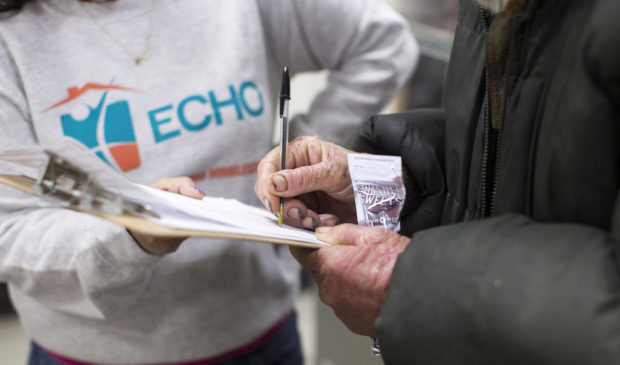City audit says Austin doesn’t effectively help people get out of homelessness – or measure progress
Wednesday, February 27, 2019 by
Andrew Weber, KUT A new audit of the homelessness service providers in Austin says the city doesn’t always hold providers accountable.
The report from the City Auditor found nine of the city’s largest contracts in 2017 met city benchmarks for service only about half the time. The audit is the final part of a four-part review of the city’s response to homelessness.
Assistant City Auditor Andrew Keegan says some goals were missed because of funding cuts, but the audit also found some of those contracts were amended to lower benchmarks.
For example, Austin Public Health amended one contract four times to lower the minimum number of clients served. The audit said those amendments were “not holding service providers accountable for poor performance.” Austin Public Health told auditors the changes were a result of a typo, though Keegan said several contracts reviewed were amended in a similar fashion.
“What we were a little concerned about was that, over the term of the contract, contracts were frequently amended and performance goals were lowered,” Keegan told KUT. “Our concern was the transparency around these amendments. They are public … but they don’t get the same level of discussion that the initial contract would.”
The audit also found service providers are not necessarily serving the right people who may be at risk of eviction or homelessness.
The Department of Housing and Urban Development considers four-person households making $13,000 a year to be the most at risk of homelessness in Austin. But the audit found fewer than half of the people seeking legal help, temporary rentals and assistance with utility bills met that threshold in 2017.
Most four-person households served by Austin Public Health earned up to $50,000 a year in that same time period.
“In Austin, a family of four making about $13,000 is the most at risk,” Keegan said. “So, if they’re the most at risk, but we’re allowing people with much higher incomes to participate in these programs, then we’re not really targeting the people who are most at risk.”
The audit also found the city can’t always track whether a person returns to homelessness because not all providers are using a uniform reporting system. Some providers use electronic records, while others use paper records.
The services themselves, the audit found, need to be balanced with better case management. A national study looking at Austin found half of all clients who received case management at ARCH in 2017 got into housing, while less than 1 percent of clients who didn’t have their cases managed got into housing. On top of that, many people trying to get out of homelessness may have multiple case managers who don’t necessarily communicate with one another. The auditor’s office suggests having a single point of contact or a centralized system to cut down on redundancy and confusion.
Still, the review touted the city’s efforts to combat homelessness and expand affordability in Austin, citing the November bond for affordable housing, the Austin City Council’s increase in city money for providers and efforts to end homelessness among veterans.
“It’s not all doom and gloom. It’s still a significant problem. It’s not solved in any stretch of the imagination,” Keegan said. “But it is being worked on. Smart people are doing their best and trying everything they can to address this issue.”
Auditors will present their report to the city’s Audit and Finance Committee at a meeting Wednesday starting at 9 a.m.
This story was produced as part of the Austin Monitor’s reporting partnership with KUT. Photo by Gabriel C. Pérez/KUT.
The Austin Monitor’s work is made possible by donations from the community. Though our reporting covers donors from time to time, we are careful to keep business and editorial efforts separate while maintaining transparency. A complete list of donors is available here, and our code of ethics is explained here.
You're a community leader
And we’re honored you look to us for serious, in-depth news. You know a strong community needs local and dedicated watchdog reporting. We’re here for you and that won’t change. Now will you take the powerful next step and support our nonprofit news organization?




